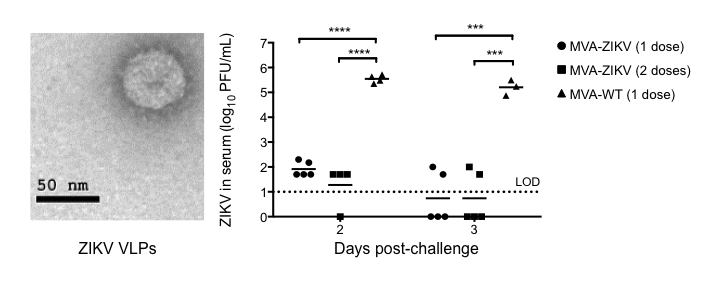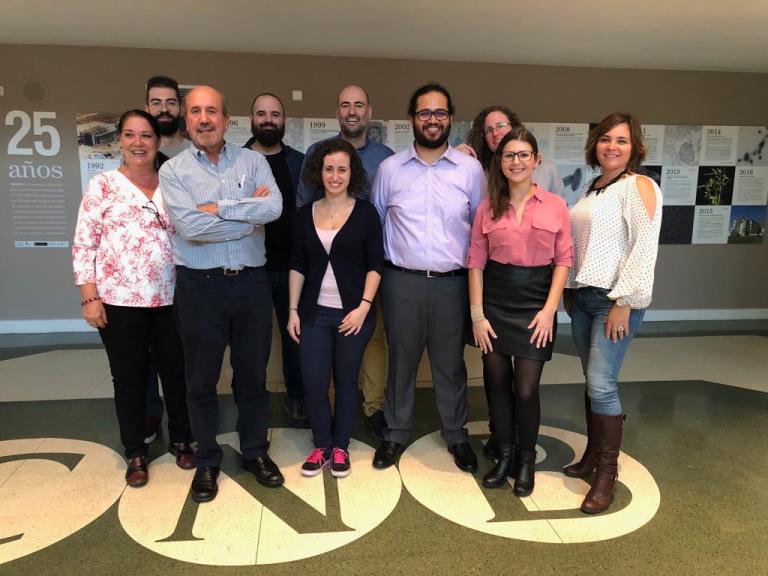Mariano Esteban
Group Leader
Research summary
The main objectives of our laboratory are geared towards understanding the molecular basis of the biology of infectious agents and their interaction with the host, as well as to use this knowledge in the development of vaccines that might be effective against emerging viruses, like HIV, chikungunya, ebola, zika, hepatitis C, coronavirus, as well as against cancer. As a model system of an infectious agent and as a delivery vector for expression of genes of interest, we used vaccinia virus (VACV) and the attenuated strains MVA and NYVAC, members of the poxvirus family. Our goal is to develop the best-in-class immunogens and vaccination protocols to be applied against prevalent human diseases.
Publications
Lázaro-Frías A, Gómez-Medina S, Sánchez-Sampedro L, Ljungberg K, Ustav M, Liljeström P, Muñoz-Fontela C, Esteban M, García-Arriaza J Distinct Immunogenicity and Efficacy of Poxvirus-based Vaccine Candidates against Ebola Virus expressing GP and VP40 Proteins. J Virol. 2018; Mar 7. pii: JVI.00363-18
Pérez P, Q Marín M, Lázaro-Frías A, Jiménez de Oya N, Blázquez AB, Escribano-Romero E, Sorzano COS, Ortego J, Saiz JC, Esteban M, Martín-Acebes MA, García-Arriaza J A vaccine based on a modified vaccinia virus ankara vector expressing zika virus structural proteins controls zika virus replication in mice Sci Rep 2018; 8: 17385
Raman SC, Mejías-Pérez E, Gomez CE, García-Arriaza J, Perdiguero P, Vijayan A, Pérez-Ruiz M, Cuervo A, Santiago C, Sorzano COS, Sánchez-Corzo C, Moog C, Burger JA, Schorcht A, Sanders RW, Carrascosa JL and Esteban M The Envelope-Based Fusion Antigen GP120C14K Forming Hexamer-Like Structures Triggers T Cell and Neutralizing Antibody Responses Against HIV-1. Front Immunol 2019; Dec 4;10:2793
Perdiguero B, Gómez CE, García-Arriaza J, Sánchez-Corzo C, Sorzano COS, Wilmschen S, von Laer D, Asbach B, Schmalzl C, Peterhoff D, Ding S, Wagner R, Kimpel J, Levy Y, Pantaleo G, Mariano Esteban Virological and Immunological Characterization of Novel NYVAC-Based HIV/AIDS Vaccine Candidates Expressing Clade C Trimeric Soluble gp140(ZM96) and Gag(ZM96)-Pol-Nef(CN54) as Virus-Like Particles. Front Immunol. 2019; 10: 2941
Pantaleo G, Janes H, Karuna S, Grant S, Ouedraogo GL, Allen M, Tomaras GD, Frahm N, Montefiori DC, Ferrari G, Ding S, Lee C, Robb ML, Esteban M, Wagner R, Bart PA, Rettby N, McElrath MJ, Gilbert PB, Kublin JG, Corey L, and the NIAID HIV Vaccine Trials Network. Safety and immunogenicity of a multivalent HIV vaccine comprising envelope protein with either DNA or NYVAC vectors (HVTN 096): a phase 1b, double-blind, placebo-controlled trial. Lancet HIV 2019; Volume 6, ISSUE 11, Pe737-e749.
 The research interest of the Poxvirus and Vaccines Group focuses in the control of human pathogens by developing safe and effective vaccines. This is accomplished by studying the biology of poxviruses and their application as vaccine candidates, using cultured cells as well as various animal models (mice and monkeys) together with human clinical trials. We have engineered vaccine candidates against diseases like HIV/AIDS, hepatitis C, chikungunya, ebola, zika, malaria and leishmaniasis, some of which have advanced to phase I/II clinical trials (HIV). By studying the behavior of replication competent and incompetent highly attenuated poxvirus vectors MVA and NYVAC expressing antigens from pathogens, our group has made important contributions in the immune biology of vaccinia virus and of recombinant vectors, the role of T and B cell in triggering specific immune responses, and correlates of protection. In the 2017-2018 period, in collaboration with other groups, we have made the following achievements:
The research interest of the Poxvirus and Vaccines Group focuses in the control of human pathogens by developing safe and effective vaccines. This is accomplished by studying the biology of poxviruses and their application as vaccine candidates, using cultured cells as well as various animal models (mice and monkeys) together with human clinical trials. We have engineered vaccine candidates against diseases like HIV/AIDS, hepatitis C, chikungunya, ebola, zika, malaria and leishmaniasis, some of which have advanced to phase I/II clinical trials (HIV). By studying the behavior of replication competent and incompetent highly attenuated poxvirus vectors MVA and NYVAC expressing antigens from pathogens, our group has made important contributions in the immune biology of vaccinia virus and of recombinant vectors, the role of T and B cell in triggering specific immune responses, and correlates of protection. In the 2017-2018 period, in collaboration with other groups, we have made the following achievements:
- We identified immune mechanisms and established T and B cell immune responses relevant to protection against HIV-1 in preclinical studies (mice and monkeys).
- We defined, in a phase I clinical trial, the immunogenicity of a prophylactic clade C vaccine (MVA-C) against HIV-1 developed by our group, as well as the long-term immune responses to a clade B vaccine candidate (MVA-B).
- We generated novel vaccine candidates and established protocols of immunisation that are safe and efficiently protect animals against pathogens: chikungunya, ebola, zika, malaria and leishmaniasis.
Our current research is aimed to fight through vaccination against prevalent human diseases caused by emerging viruses. As such, we will optimize the immunogenicity of the poxvirus vectors MVA and NYVAC as recombinant vaccine candidates, and develop protocols of immunization, either alone or in combination with other immunogens (DNA, mRNA, replicon, VSV, protein) that trigger potent and durable immune responses. By studying the immunogenicity and efficacy of these vaccines in preclinical and clinical trials, we will identify immune mechanisms and correlates of protection. Our goal is to develop the best-in-class vaccines and vaccination approaches to be used in clinical trials. This research is supported by national and international grants, resulted in the publication of over 350 papers in international journals, 11 patents and the direction of 34 PhD theses. We maintain a fruitful collaboration with HIV vaccine experts in the USA and Europe through CAVD projects financed by the Bill and Melinda Gates Foundation and EU H2020 programs, as well as with other national and international colleagues working on vaccines.








